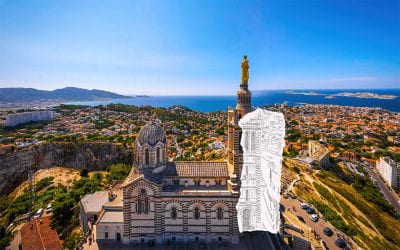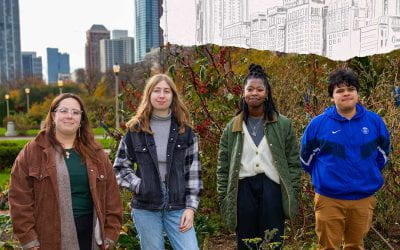Get Together and Make Something Happen
American Dream Conference Recapby Laura Janota
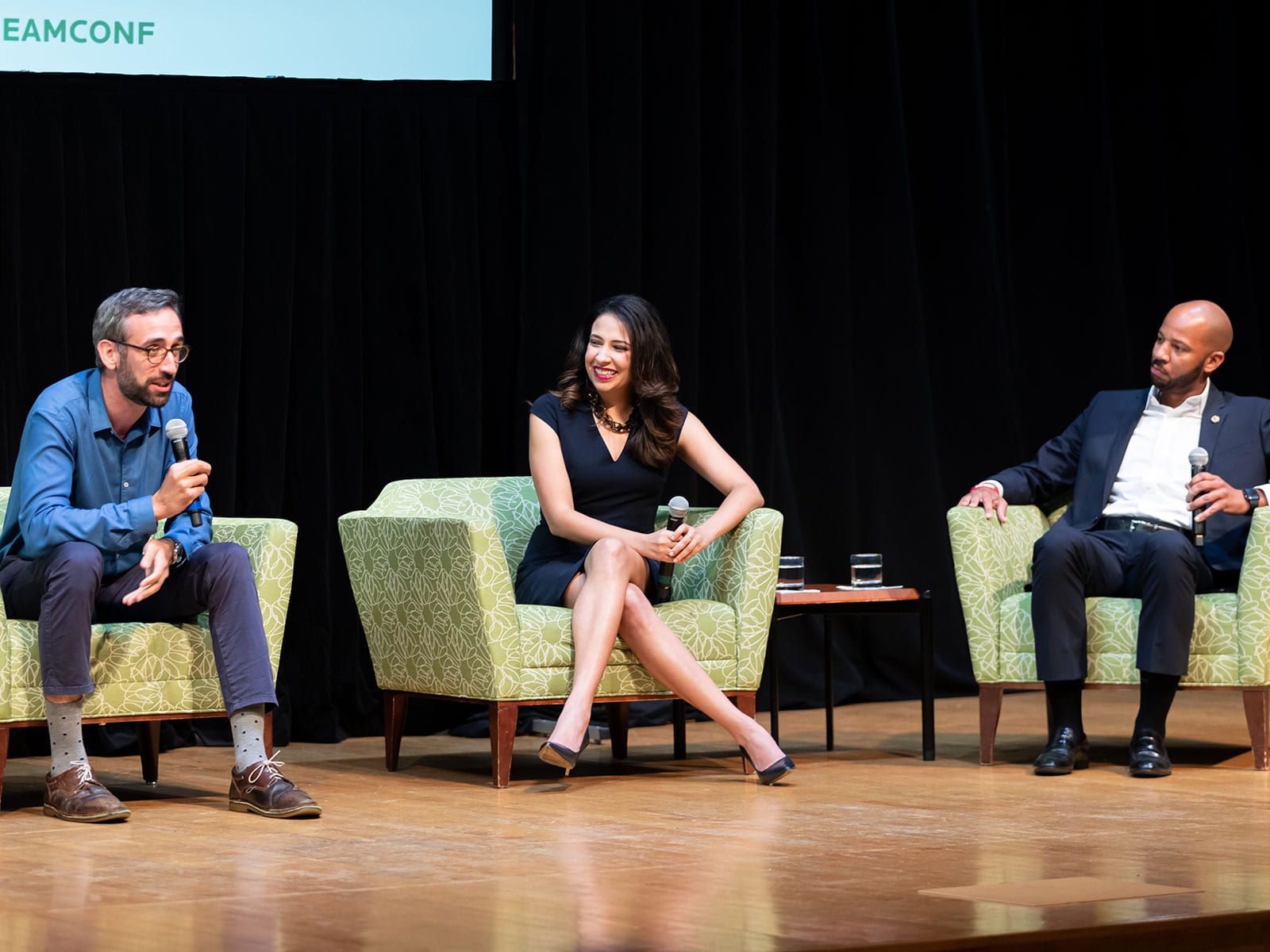
From left to right: Will Guzzardi, Erika N.L. Harold and Lamont J. Robinson Jr.
Clara Ochoa is no stranger to community service, but this time felt different for the 22-year-old criminal justice major. Ochoa sensed urgency.
A committed volunteer, Ochoa was preparing a meal for people experiencing homelessness during one of six service events on American Dream Service Day.
“Stop spending so much time on your laptops and phones,” she suggested when asked how young people can make a difference. “Know that it’s the little things we do in life that count — and that means getting involved, even if it’s at the most basic level.”
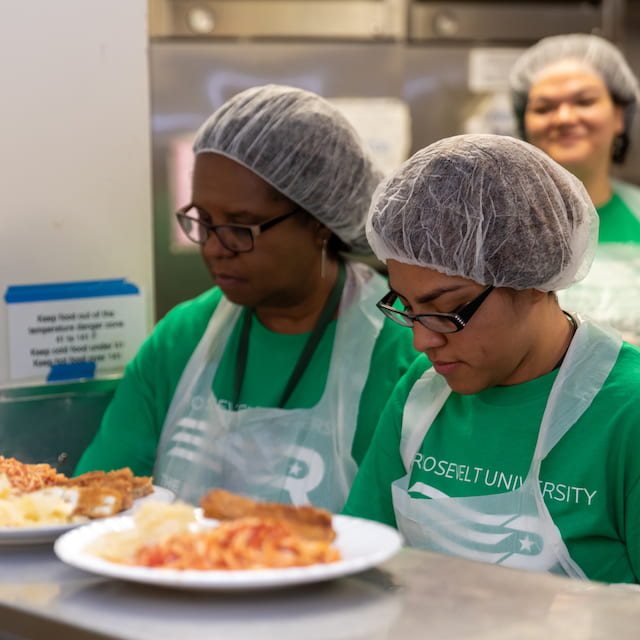
Clara Ochoa at American Dream Service Day
That kind of call for involvement and activism defined the fourth annual American Dream Reconsidered Conference, where experts stressed the power of community to tackle problems.
A group of young Illinois political leaders, who opened the five-day conference, said that their campaigns grew momentum from talking to as many neighbors as possible and speaking out at local gatherings.
“When you speak from the heart about issues, you are seen as part of a movement,” said Will Guzzardi, a two-term Illinois state representative who told of first getting his foot in the door as a journalist. “It gave me a network to start with,” he explained. “It helped … to show up for things before actually running for office.”
“It’s the little things we do in life that count — and that means getting involved, even if it’s at the most basic level.”
— Clara Ochoa (BA Criminal Justice, ’20)
With the advantage of community, Americans can make change — even at the global level, according to Kelly T. Clements, United Nations deputy high commissioner for refugees.
“There are all kinds of things you can do locally,” said Clements. “Contribute to your local church … talk about the refugee situation in human terms in your community … have a conversation that brings people together.”
Without collective effort, monumental goals like reducing violence in Chicago neighborhoods cannot be achieved, according to panelists at the “New Architecture of Violence Reduction in Chicago” session. The event, sponsored by the Institute for Nonviolence Chicago and the Adlai Stevenson Center on Democracy, brought together leaders from community service providers that combine to make an impact on Chicago’s high-risk neighborhoods.
“There isn’t just one institution” working to achieve violence reduction,” remarked Miguel Cambray, director of employment at READI Chicago. “It’s about collaboration.”
“It is relationship building,” added Teny Oded Gross, founder and executive director of the Institute for Nonviolence Chicago. In the grassroots-led violence-reduction initiative, strength depends on the condition of all 77 Chicago communities, and the ultimate aim, according to Gross, is to “keep surrounding walls until they crumble.”
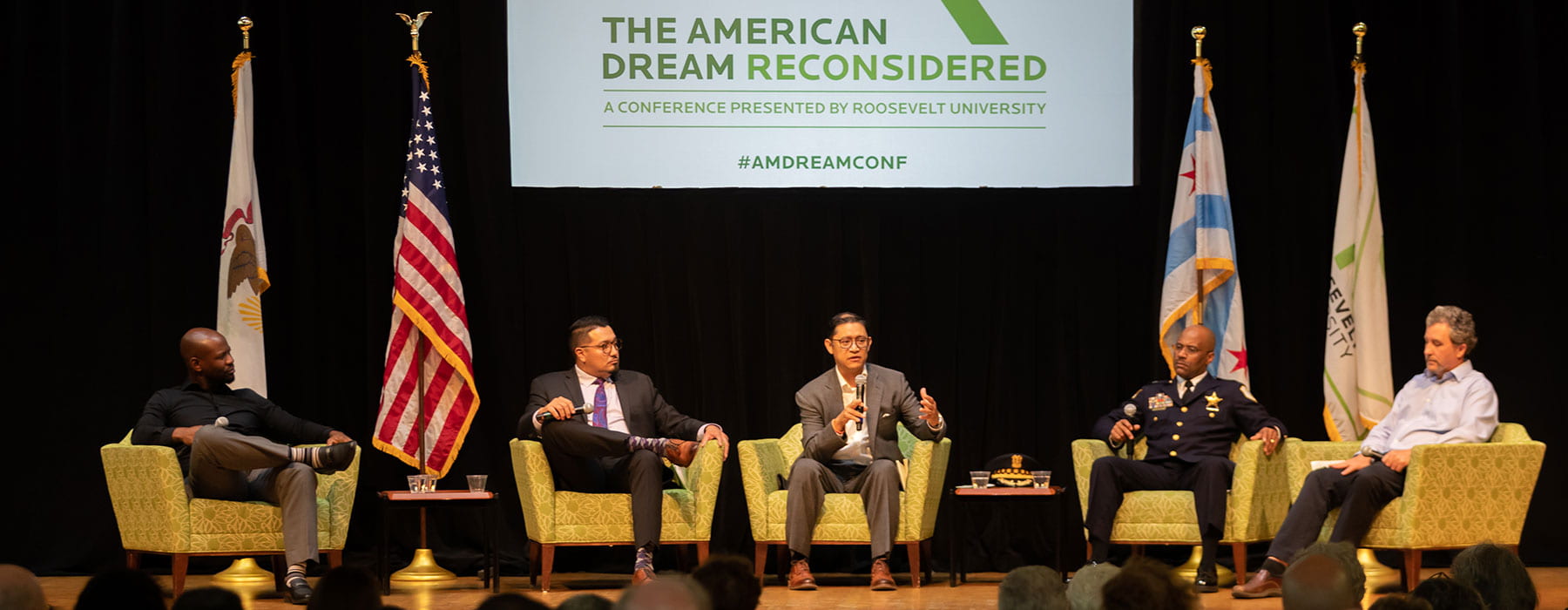
From left to right: Vaughn Bryant, Miguel Cambray, Ric Estrada, Ernest Cato III and Teny Gross
Roosevelt biology student Tatiana Sosa has been doing a little of that on her own, chipping away at Chicago poverty with visits each winter to Lower Wacker Drive, where she delivers food, blankets and clothing to people experiencing homelessness.
“There’s so much hate and negativity out there,” said Sosa. “What we need to do is give people hope that their lives can be better.” On American Dream Service Day, the biology student made meals for people experiencing homelessness with Breakthrough Manna Ministry.
Attended by faculty, staff, alumni and friends of the University, this year’s American Dream Service Day included large-scale efforts to assemble hygiene kits and deliver them to area shelters.
“Contribute to your local church. Talk about the refugee situation in human terms in your community. Have a conversation that brings people together.”
-Kelly T. Clements,
U.N. deputy high commissioner on refugees
“This is the first time I’ve done this, and it’s changed my way of thinking,” said psychology student Giselle Garcia. She views donations of small essentials as vital for making a dent in the struggle with poverty.
“I’ve always tried to take advantage of service opportunities like this,” said Karina Herrera, president of the United Nations Student Association and Roosevelt’s ONE.org chapter. Herrera earned her bachelor’s degree in integrated marketing communications at Roosevelt before returning for her master’s in public administration.
“We want the United Nations Global Fund to be fully funded,” she said. “This is a necessity — and an experience — that emphasizes investment in public health around the world today.”
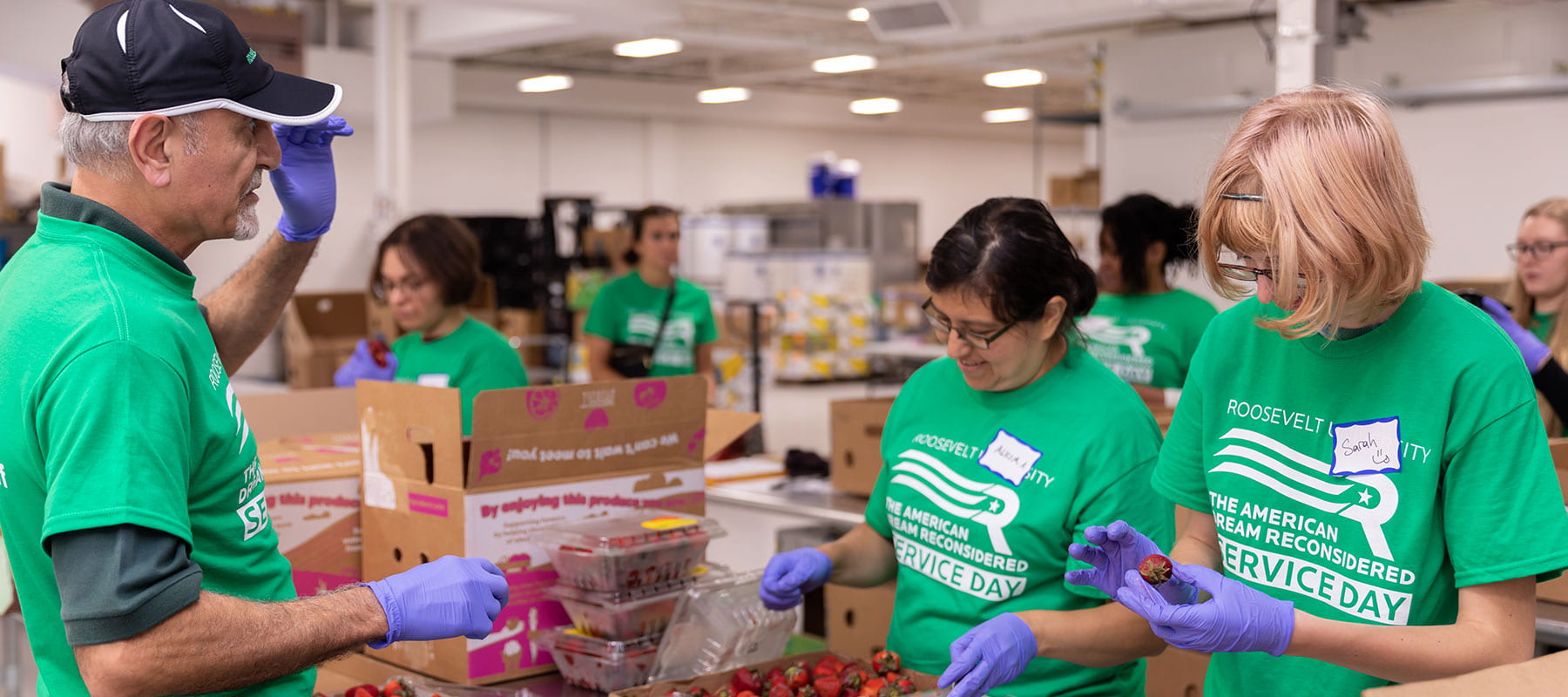
President Ali and volunteers at The American Dream Reconsidered Conference Service Day
On American Dream Service Day, her organization hosted a letter-writing campaign where students wrote hundreds of messages to their representatives about the fund, which provides medications, supplies and research for cures to life-threatening illnesses.
The importance of access to public health was also a focus at the conference’s “Listening to Community Voices” luncheon. The Robert R. McCormick Foundation sponsored the session, which brought together leading service providers to discuss how corporate organizations can make a difference in the communities they serve.
Laron Taylor, director of the Blue Cross Blue Shield of Illinois (BCBSI) Blue Door Neighborhood Center serving Chicago’s Roseland and Pullman areas, talked of operating at a “hyper-local level.” Issues like health care often intersect with other community needs, dependent on local context.
“We are seeing an intersection of systems — education, transportation, health and housing being some that are coming together,” added Clarita Santos, executive director of community health initiatives for BCBSI.
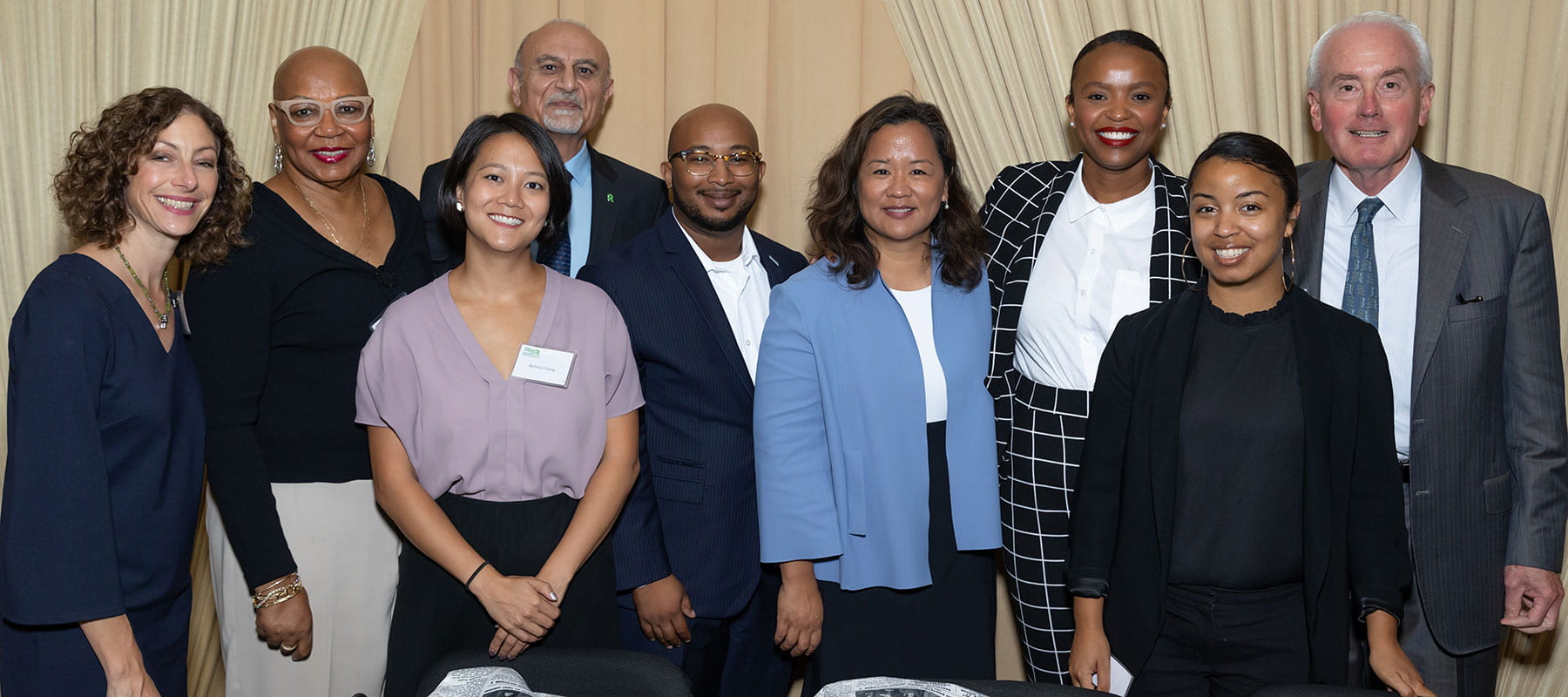
Listening to Community Voices Luncheon
Many at the luncheon concluded that “holistic thinking” by providers will be the way forward, not only in solving individual problems, but also in building stronger communities.
That concept also carries over to grassroots organizing, which requires melding of parts into a whole, according to Ben Wikler, new chair of the Wisconsin Democratic Party, who previously was a senior advisor at moveon.org. “It becomes an “us’ rather than a ‘me’ pursuit,” said Wikler at the “Activism and Grassroots Change” panel. “Identify your gift … Find something you care about and get started … You’ll find people that have different gifts,” a good thing as “the work requires so many gifts.”
Raneen El-Barbarawi, an international studies student who volunteered with the service day’s letter-writing campaign, agreed with the principle of collaborative effort.
“This is not just a you or I problem,” said El-Barbarawi. “It’s an everyone problem … Just because these things don’t impact you directly doesn’t mean you shouldn’t get involved.”
“Find something you care about and get started.”
Ben Wikler
“Activism and Grassroots Change” panel

Charles H.F. Davis III
Charles H.F. Davis III, director of research and chief strategy officer at the University of Southern California’s Race and Equity Center, gave the final lecture of the conference. The Ida B. Wells Lounge overflowed with students in green service day t-shirts.
“There is power in this room,” he said. “If we all work together, something miraculous can happen. Can you see it? Can you feel it?” Davis asked students to repeat after him: Power. Transformation. Miracles. “I want it. I need it. I gots to have it,” everyone shouted together.
“This is a rehearsal you are preparing for the stage that you do not yet know is coming,” he said.
As many in the audience raised hands to ask how they could stay involved after the conference, Davis had advice on how to keep the flame alive. “Get together and make something happen,” he said.
More in this section
unexcused absence
Some of life’s most important lessons cannot be taught inside the four walls of a classroom. Matthew Beardmore’s travel has forced him to reassess how he thinks about work, family, politics, injustice and many other issues. He’s no longer tied to the beliefs of where he grew up.
traveling while home: self-discovery through the local
How can you make the long trip home if you don’t actually leave there? A partnership between Roosevelt University’s Honors Program and Chicago Architecture Center asks students to experience space and place as sites for action—not simply places we passively inhabit.
creating a new travel niche while wandering the globe
In early 2011, Sahara Rose De Vore bought a one-way ticket to Costa Rica. Over the next 10 years, she explored 84 countries. The self-discovery she experienced inspired her to launch two successful businesses—both helping others discover the benefits of travel.

